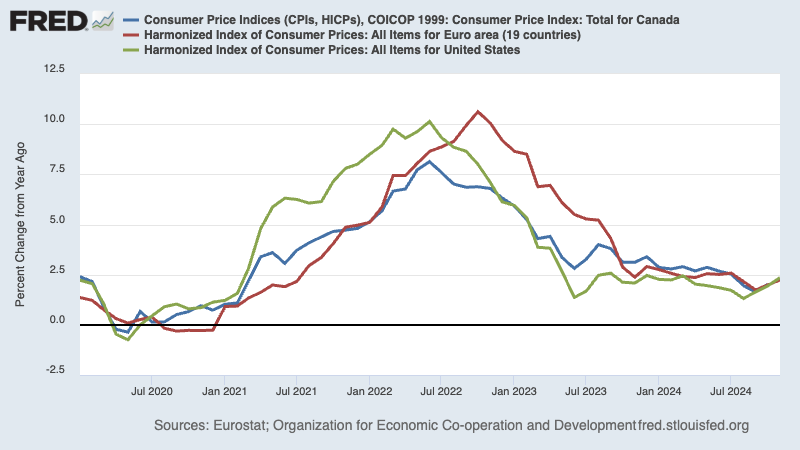Just to be clear, the subtitle on this post is a joke. Trump may accomplish many terrible things, but annexing Canada won’t be one of them. Which is a good thing, for many reasons. One of the least important of those reasons — but it matters to me — is that Canada has sometimes been an economic laboratory, a nation that because of its unusual position has tried out various policies before the rest of the world.
By the way, I’m not going to say anything about Justin Trudeau or Canadian politics, of which I know nothing, except to note that whatever else he may have messed up, Trudeau has clearly been punished for the same inflationary wave that hit every other advanced economy. More on that in a minute.
I’m also not going to get into Canada’s lagging economic growth, which Noah Smith has gone on about at length. Noah makes many interesting points, especially about the potentially warping effect of oil exports. But I’ll just note that everyone’s growth has lagged America’s — the Europeans are more or less frantic about it — which suggests that this may be more a story about America than about Canada.
So, about Canada as laboratory: Back in 1999 Robert Mundell won a richly deserved economics Nobel for his seminal work in international macroeconomics. As I noted at the time, however, Mundell’s most influential papers, written in the early 1960s, envisioned a world of highly mobile capital and floating exchange rates. Yet for the most part the world he was writing in didn’t look like that: international capital flows were still highly restricted and almost every currency was pegged to the U.S. dollar.
There was, however, one country that did look like that — his home country, Canada. In effect Mundell envisioned a world economy that would become Canadianized. And after the breakup of Bretton Woods, that’s exactly what happened.
Another case of Canada-as-laboratory was Brexit. Although I believed that Brexit would hurt the UK economy (its actual consequences deserve at least one separate post), I never bought into scenarios of catastrophe. Why? Because I knew about another example of a country that neighbors a large customs union but isn’t part of that union and doesn’t have free movement of people across its border with that union. And while Canada might be richer if its provinces were U.S. states, it’s obviously not an economic disaster area.
Back to inflation. As I and many others have noted, the recent inflationary surge happened almost everywhere and was similar in size everywhere too. This makes it difficult to place the blame for any one country’s inflation on the government in power, whether it was the Biden administration or, to be fair, Britain’s Tories. And Canada is part of the same pattern:
But wait, you say. Isn’t Canada different? It is, after all, very closely tied to the U.S. economy. Given that the bulk of its population lives close to the U.S. border, I sometimes like to say that Canada is closer to America than it is to itself. So wasn’t it obvious that Canada would share in U.S. inflation? Can’t we say that Canada’s inflation was Biden’s fault?
Actually, no. The Canadian dollar, the Loonie, fluctuates against the U.S. dollar, sometimes by a lot. So Canada can and sometimes in the past has had very different inflation from the United States.
In particular, for idiosyncratic reasons Canada followed a much more aggressive anti-inflationary strategy than the U.S. in the early 1990s, briefly getting inflation roughly to zero:
The results were disastrous, as summarized in Pierre Fortin’s classic analysis, The Great Canadian Slump. I drew a lot on Canadian experience and Fortin’s analysis in my own attempts to analyze sluggish recovery from the 2008 financial crisis.
And given that Canadian inflation has in the past diverged from U.S. inflation, the similarity of the Canadian experience — and the British and European experiences — to our own is further evidence that factors like the disruption of global supply chains, not domestic policies — whether Biden’s or Trudeau’s — were the main factors behind inflation.
Still, Trudeau is out. I have zero insight into who will replace him, although it’s curious that I personally know both Chrystia Freeland — whose blistering resignation letter is a thing of beauty — and Mark Carney, apparently two of the leading contenders. Both are smart and well-informed, which would be disqualifying for positions in the incoming U.S. government.
MUSICAL CODA
Canada really has produced some extraordinary singer-songwriters






I am routing for Chrystia Freeland. I am imagining Claudia Sheinbaum to the south and Freeland to the north making a fool of Trump every step of the way.
If Canada were the 51st state, it would have the same clout as California in government (# of congressmen) and would be very much a democratic state. Trump should be careful of what he wishes for....